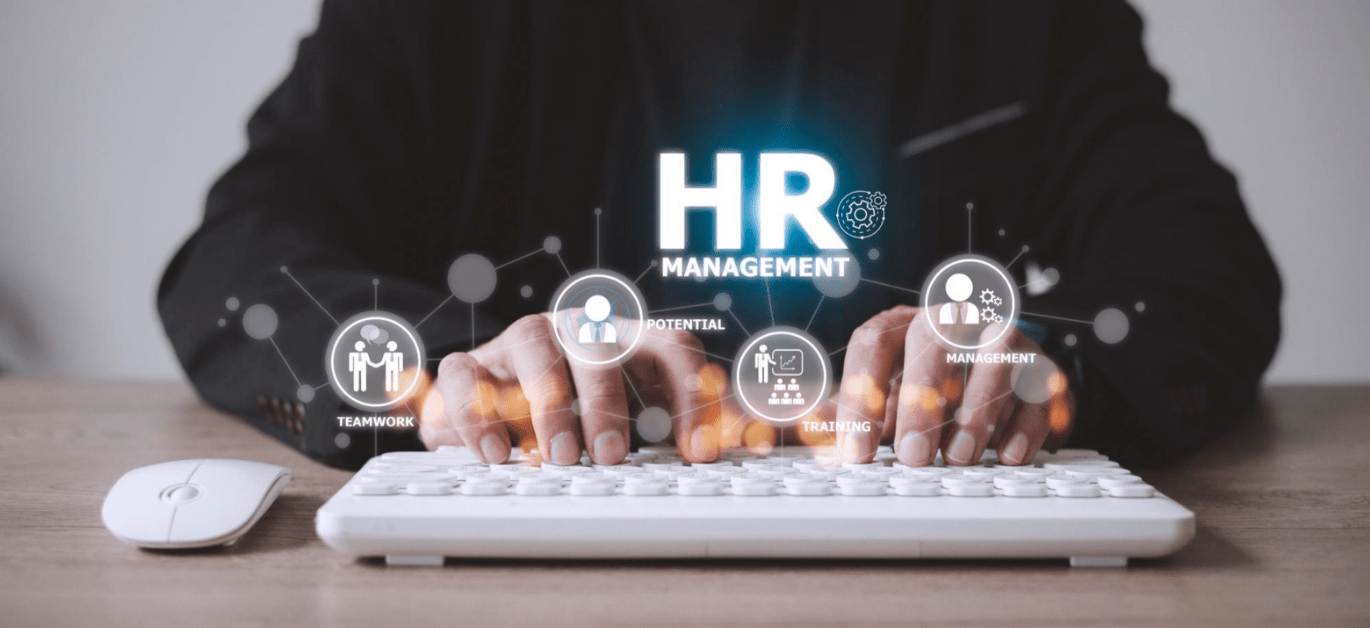
Enterprise Resource Planning (ERP) system is a software solution that is designed to integrate and simplify the core business operations of an organization. These include finance, supply chain management, human resources, and customer relationship management. ERP systems provide a single platform for data management, collaboration, and decision-making.
In order to achieve operational efficiency, precise data, and informed decision-making in the modern business landscape, integration of enterprise resource planning (ERP) systems and human resource management (HRM) procedures is essential. An open-source ERP program called ERPNext has numerous features designed to improve HR functions, boost employee involvement, and promote organizational achievements. Now, let’s examine how an ERP system like ERPNext is crucial for Human Resource Management by considering its key features and functions.
Efficient Recruitment Management :
The recruitment module of ERPNext automates the whole hiring process, starting from posting job openings to selecting candidates, ensuring efficient recruitment management. Department heads can use it to advertise job openings, schedule interviews, track the status of applications, and improve collaboration and transparency in hiring procedures. The Kanban-style user interface of the software enables users to track the progress of applicants in the recruitment pipeline, from application review to interviews and offer negotiation.
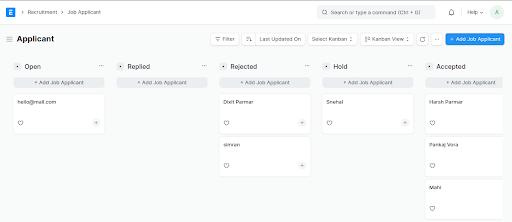
Seamless Employee Onboarding :
ERPNext simplifies the employee onboarding process for new employees using automated workflows tailored to each employee’s duties and responsibilities. ERPNext facilitates effective communication and teamwork among HR professionals and new employees through user-friendly interfaces and personalized templates, fostering a friendly atmosphere. This structured approach helps workers quickly adjust and add value to the company, boosting productivity and involvement right from the beginning.
Training Management :
ERPNext offers a comprehensive training management module to identify training needs, schedule training programs, monitor employee participants, and evaluate progress. HR professionals can create training programs, set up training sessions, and evaluate training outcomes by utilizing performance metrics and feedback systems. This adaptability supports ongoing learning and skill enhancement, matches employee abilities with company objectives, and enhances workforce efficiency.
Attendance and Shift Management :
ERPNext simplifies the task of monitoring employees’ attendance and shift schedules by automating the process. Supervisors would be able to allocate shifts according to the requirements of the organization and the availability of staff members, due to the user-friendly features of ERP. The system allows employees to clock in and out, ask for time off, and see their schedules, increasing transparency and accountability. Managers can monitor attendance patterns in real time using attendance tracking systems. Automating these procedures enhances productivity in the organization’s workforce, and aids in distributing resources more effectively among various departments.
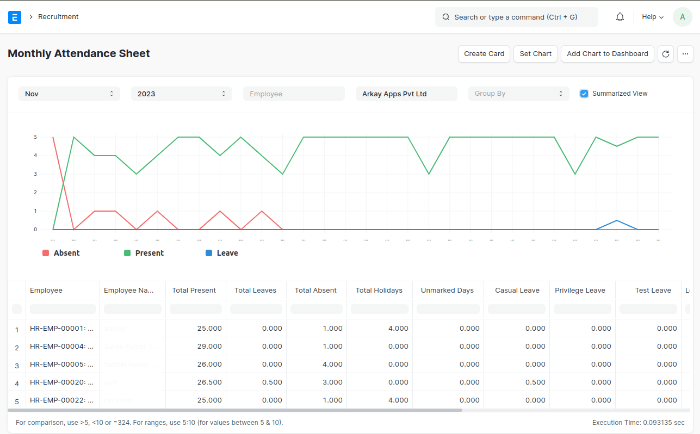
Task and Timesheet Tracking :
With ERPNext’s robust features for task and timesheet tracking, one can keep track of project progress and resource usage in real time. As a manager, you can assign tasks and set deadlines, as well as track time on each activity. This makes it easier to manage projects and allocate resources. This feature encourages transparency, accountability, and efficiency when it comes to task execution. Teams can ensure that they’re meeting project deadlines and delivering deliverables on time.
Effective Performance Management :
ERPNext streamlines performance data and analysis for efficient tracking of employee performance. You can set performance goals and conduct evaluations, as well as provide feedback based on up-to-date insights and KPI tracking. By utilizing this approach based on data, you can promote accountability, identify skill gaps, and support ongoing professional development initiatives.
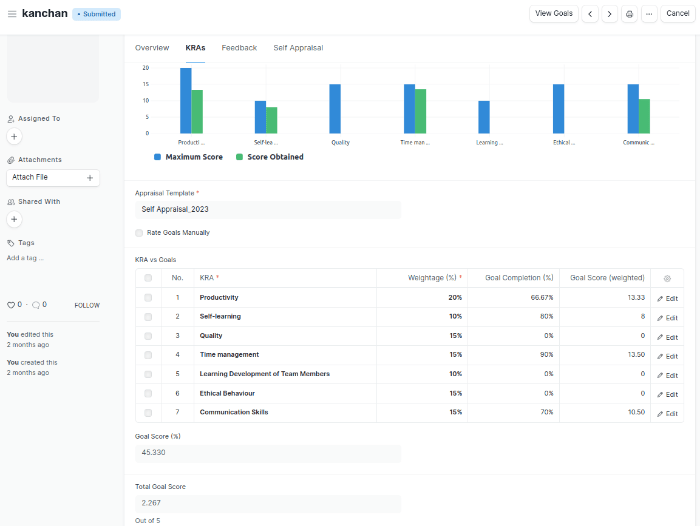
Automated Payroll Processing :
ERPNext’s HR and payroll module simplifies payroll processing by utilizing preset formulas and configuring various salary elements such as basic pay, benefits, bonuses, deductions, etc. This system enables users to tailor their payroll to accommodate various job functions and department requirements. This automation reduces the workload for your HR team and decreases the chance of errors, allowing you to complete your payroll promptly and efficiently in a timely manner.
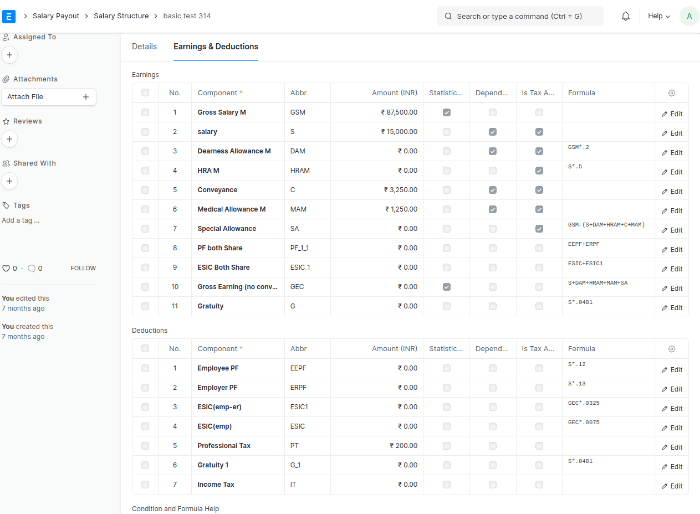
Comprehensive Reporting :
ERPNext offers extensive reporting features for HR managers by collecting data from various areas of the company. HR professionals can access information on employee demographics, performance, turnover rate, compensation trends, and more through customizable dashboards and analytics tools. This information can assist in making decisions based on data, aiding in strategic workforce planning and continuous improvement initiatives.
Facilitating Strategic HR Planning :
Using a system such as ERPNext, HR managers can retrieve important information on workforce performance, skills, talent, and other relevant aspects. This information can be utilized to recognize high-potential staff members, prepare for leadership changes, and create talent recruitment plans that support HR methods with future business goals.
Enhancing Employee Experience with Self-Service Portals :
Employee self-service portals in ERP systems enable employees to view and access their information, ensuring data accuracy. Workers can request time off through ERPNext, providing details about the type, duration, and cause of their leave, for managers to evaluate and authorize on the platform. Workers can conveniently view their salary slips online, enhancing transparency. This not only improves employee satisfaction but also decreases HR staff’s workload.
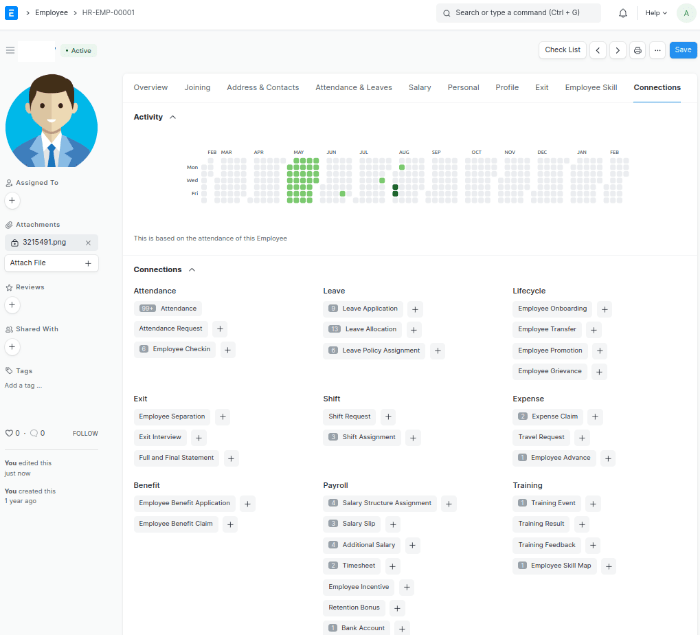
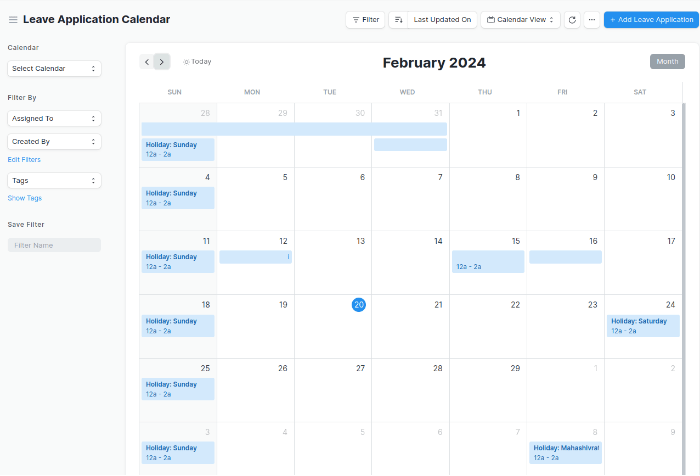
Impact on Employee Lifecycle :
ERPNext works effectively with HRM and greatly influences the complete employee life cycle, spanning from recruitment to retirement. ERPNext makes different stages of the employee experience easier and more tailored, enhancing training success and showcasing a company’s dedication to employee advancement and individual growth.
In conclusion, utilizing an Enterprise Resource Planning (ERP) system, such as ERPNext, incorporating Human Resource Management (HRM) practices, enhances organizational efficiency and employee satisfaction across their employment lifecycle. ERP systems enhance HR functions by simplifying recruitment, onboarding, training, attendance monitoring, performance evaluation, payroll handling, and reporting. In addition, self-service portals enable employees by encouraging transparency and participation while reducing administrative burden. Ultimately, the significance of an ERP system in HRM lies in its capability to synchronize HR strategies with business objectives, boost employee efficiency, and cultivate a culture of ongoing improvement and satisfaction among employees.
